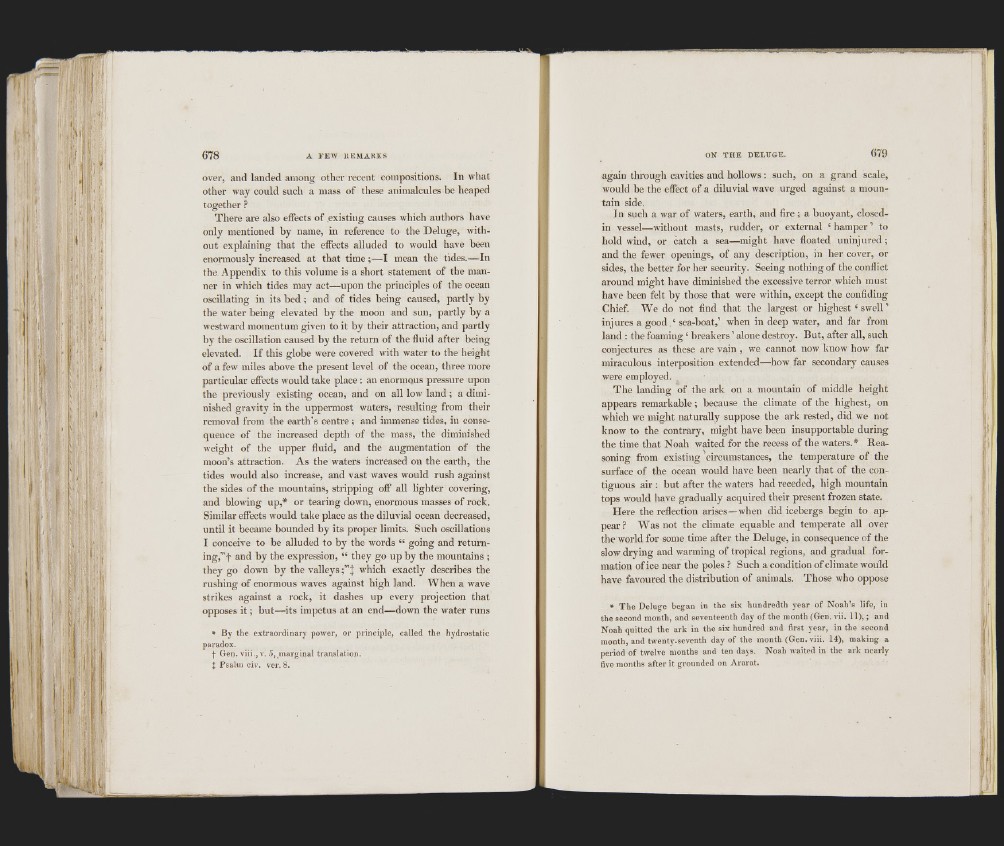
f . i
¡i f'
FEW REMARKS
over, and landed among other recent compositions. In what
other way could such a mass of these animalcules he heaped
together ?
There are also effects of existing causes which authors have
only mentioned hy name, in reference to the Deluge, without
explaining that the effects alluded to would have been
enormously increased at that time ;—I mean the tides.—In
the Appendix to this volume is a short statement of the manner
in which tides may act—upon the principles of the ocean
oscillating in its b ed ; and of tides heing caused, partly by
the water heing elevated by the moon and sun, partly by a
westward momentum given to it by their attraction, and partly
by the oscillation caused by the return of the fluid after being-
elevated. I f this globe were covered with water to the height
of a few miles above the present level of the ocean, three more
particular effects would take place: an enormous pressure upon
the previously existing ocean, and on all low land; a diminished
gravity in the uppermost waters, resulting from their
removal from the earth’s centre; and immense tides, in consequence
of the increased depth of the mass, the diminished
weight of the upper fluid, and the augmentation of the
moon’s attraction. As the waters increased on the earth, the
tides would also increase, and vast waves would rush against
the sides of the mountains, stripping off all lighter covering,
and blowing up,* or tearing down, enormous masses of rock.
Similar effects would take place as the diluvial ocean decreased,
until it became bounded by its proper limits. Such oscillations
I conceive to he alluded to by the words “ going and return-
ing,”t and by the expression, “ they go up by the mountains ;
they go down by the val leys j which exactly describes the
rushing of enormous waves against high land. When a wave
strikes against a rock, it dashes up every projection that
opposes i t ; hut—its impetus at an end—down the water runs
• By the extraordinary power, or principle, called the hydrostatic
paradox.
f Gen. viii., V. 5,.marginal translation.
J Psalm civ, ver. 8.
ON TH E DELUGE.
again through cavities and hollows ; such, on a grand scale,
would be the effect of a diluvial wave urged against a mountain
side.
In such a war of waters, earth, and fire ; a buoyant, closed-
in vessel—without masts, rudder, or external ‘ hamper’ to
hold wind, or catch a sea—might have floated uninjured ;
and the fewer openings, of any description, in her cover, or
sides, the better for her security. Seeing nothing of the conflict
around might liave diminished the excessive terror which must
have been felt by those that were within, except the confiding
Chief. We do not find that the largest or highest ‘ swell ’
injures a good .‘ sea-hoat,’ when in deep water, and far from
land ; the foaming ‘ breakers ’ alone destroy. But, after all, such
conjectures as these are vain , we cannot now know how far
miraculous interposition extended—how far secondary causes
were employed.
The landing of the ark on a mountain of middle height
appears remarkable ; hecause the climate of the highest, on
which we might naturally suppose the ark rested, did we not
know to the contrary, might have been insupportable during
the time that Noah waited for the recess of the waters.* Bea-
soning from existing circumstances, the temperature of the
surface of the ocean wonld have been nearly that of the contiguous
air : hut after the waters had receded, high mountain
tops would have gradually acquired their present frozen state.
Here the reflection arises—when did icebergs begin to appear
? Was not the climate equable and temperate all over
the world for some time after the Deluge, in consequence of the
slow drying and warming of tropical regions, and gradual formation
of ice near the poles ? Such a condition of climate would
have favoured the distribution of animals. Those who oppose
* The Deluge began in the six hundredth year of Noah’s life, in
the second month, and seventeenth day of the month (Gen. vii. 11), ; and
Noah quitted the ark in the six hundred and first year, in the second
month, and twenty-seventh day of the month (Gen. viii. 14), making a
period of twelve months and ten days. Noah waited in the ark nearly
five months after it grounded on Ararat.
!, ül